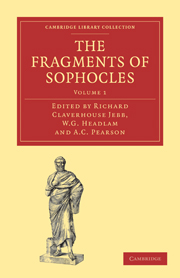FRAGMENTS OF NAMED PLAYS: Introductions, text and notes
Published online by Cambridge University Press: 07 September 2010
Summary
There are two famous stories connected with the name of Athamas, which are recorded by our authorities with great variety of detail. One of these, the escape of Phrixus and Helle, was the starting-point of the Argonautic saga; and, though the evidence of the tragedians is the earliest to which we can now appeal, it must have been related in the lost epics. Athamas, king of Thebes, by his union with Nephele, an immortal, had two children, Phrixus and Helle. He subsequently married Ino, who bore to him Learchus and Melicertes. Ino was jealous of the children of Nephele, and, when a drought Occurred—produced, according to one version, by the cunning of Ino herself—she bribed the messengers who were sent by Athamas to consult the oracle at Delphi, and persuaded them to give a false report. They accordingly announced that the god required the sacrifice of Phrixus as an expiation. Athamas was obliged against his will to consent, but Nephele succeeded in saving her children by means of a ram with a golden fleece, which Hermes gave to her. This ram, placed among the flocks of Athamas, was not only endowed with the power of speech, so that it was able to warn Phrixus of his impending danger, but also rescued him and his sister by taking them on its back, and flying away with them across the sea. Helle, unable to keep her seat, fell into the sea, and gave her name to the Hellespont; but Phrixus escaped to Colchis, where he sacrificed the ram and presented its fleece to Aeetes.
Information
- Type
- Chapter
- Information
- The Fragments of Sophocles , pp. 1 - 270Publisher: Cambridge University PressPrint publication year: 2010First published in: 1917
